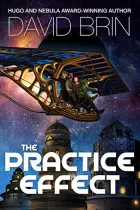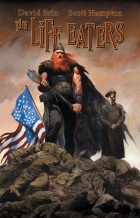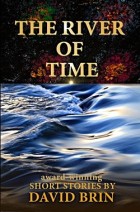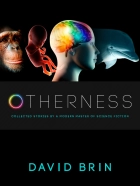All right… this one put me into fill-tilt rant mode! It’s a reaction to one of those email circulars that our crazy uncles keep sending us – you know the kind, offering vast, sweeping, counter-factual assertions in lieu of evidence, logic or even common sense, all in order to justify hating half of their fellow citizens. I generally ignore them, but this one is wildly popular among millions of “values” Americans who have been talked into full-scale nostalgia. It needs an answer.
So read on only if you’re in a mood for pyrotechnics!
 Nostalgia is for cretins. America was built by men and women who dreamed and built. Who believed – and believe – in progress. Who forgo the sick drug of hate and negotiate solutions.
Nostalgia is for cretins. America was built by men and women who dreamed and built. Who believed – and believe – in progress. Who forgo the sick drug of hate and negotiate solutions.
By people who respect skill and knowledge and the folks who have them.
America was not built by fellows like the author of this maudlin paean to yesteryear: HIGH SCHOOL — 1957 vs. 2010 who claims to have witnessed “how far our nation has declined socially, morally and spiritually…” proceeding to list scenarios such as: “Billy breaks a window in his neighbor’s car and his Dad gives him a whipping with his belt.”
Let’s follow along the author’s (fanciful) comparison between 1957 and 2010:
“1957 – Billy is more careful next time, grows up normal, goes to college and becomes a successful businessman.
2010 – Billy’s dad is arrested for child abuse. Billy is removed to foster care and joins a gang. The state psychologist is told by Billy’s sister that she remembers being abused herself and their dad goes to prison. Billy’s mom has an affair with the psychologist.”
But go ahead and read this spectacular feat of tendentious-nostalgia* and temporal myopia. You’ll laugh… when you’re not crying.
In fact, let me be honest and admit – two of these little tales, about how America had some simpler, more earthy aspects in 1957, resonate with parts of me that are – well – kinda conservative at-heart… in the old-better way William F. Buckley meant it. Still, most of this “1957” screed is drooling imbecility. Scenarios 6, 7, & 8 are merely sick fantasies.
Oh, but I was inspired! So, with the other guy’s list of time-comparisons in mind (in fairness – do peruse his versions), try on these additional contrasts between 1957 and 2010.
Hmmm let’s see.
1957: Gracie (age 13) is raped by her stepfather. Shamed into keeping silent, she’s guilt tripped for “asking for it.”
(Her eventual shrink, a Freudian, tells her she imagined it all.)
2011: Gracie has a black belt. Sucker is never going to attack a woman again. And just to make sure, she goes public.
(Oh, and Freudians are extinct, thank God.)
1957: Thomas attends a segregated school without textbooks, heat or windows. Or hope. Every media message tells him he is destined to be a servant.
2011: Thomas attends Caltech. He carries no handicaps of preconception because of his race. We all benefit from his research.
1957: Jimmy is a “four-eyes” who loves science. He is bullied, harassed, buggered and tormented. Everybody shrugs. “boys will be boys.”
(I was there, in 1957. I fought back, really well. But I saw other boys crushed, pulverized, even driven to suicide.)
2011: In most middle class areas, severe physical bullying is almost nonexistent. Today Jimmy is the CEO of a software company, making life better for everybody. Geeks and nerds are cool. And whoever wrote that “fights were honorable” in 1957 can screw himself. I was there. Some fights were like that, I recall. But the other kind – pure, vicious terrorism – were far more common. (Only jerks who used to be bullies are nostalgic for those “good old days.”)
1957: Gracie’s rape turns into a pregnancy that will ruin her life. Or she goes to a back alley abortionist. Dies in agony.
2011: Rates of teen sex, teen pregnancy, abortion, STDs, early marriage, and domestic violence are far LOWER in Blue America than they were in 1957. Divorce rates are higher, because women are empowered… but in Blue America even divorce is tipping downward, along with steeply-falling crime.
 Rates for all of these things are much higher in other parts of America – the parts that scream at us how much more “moral” their “values” are.
Rates for all of these things are much higher in other parts of America – the parts that scream at us how much more “moral” their “values” are.
One could go on and on, showing a thousand ways that THINGS ARE VASTLY BETTER today in the 21st Century! Indeed, shouldn’t they be? Didn’t those wise moms and dads of 1957 work damned hard to help make a better world?
Don’t we praise them by admitting they succeeded? Don’t we insult them by sneering that they failed? Think about that! Which of us here is deep-down more respectful to folks of earlier days? And which of us insults them as failures?
== Not everything is better ==
But to be fair… I admit that some things today are worse today than they were in 1957! Here are a few examples.
1957: Thalidomide babies are born armless. The bald eagle almost vanishes. Unregulated, toxins leak into places like Love Canal. Lakes are dying everywhere. People die unnecessarily, neglecting to use seatbelts or helmets. School kids cry because the air hurts to breathe. Polio so terrifies parents that they keep children locked inside during summer, forbidding them from going to the public pool. (I remember it all.)
But in 1957 wise and good people dream of an era when scientists can help us all figure out what substances work and which ones do harm. Following 1957’s Sputnik scare, Americans think scientists are wonderful! Soon, Jonas Salk is the most popular man in America.
2011: Ungrateful imbeciles rage against science, following radio ignoramuses into snits against vaccination, economics, meteorology, evolution, medicine and biology. Science has made terrific progress and we know tons more! Blue America keeps getting healthier and living longer. It’s an age of real wonders and American science literacy is second only to Japan’s.
But meanwhile, there’s another America – that keeps smoking and shovels down pork rinds, while self-righteously screeching that liberals are ordering them what to eat — (a damned lie). And they die young.
And the War Against Science (and every other profession that knows stuff — like journalists, teachers, doctors, professors, civil servants, attorneys and skilled labor) rages on. Yep, some things are much worse.
1957: The greatest enemy of freedom and enterprise is Soviet Communism. A terrible threat and an evil empire! Democratic president Truman establishes NATO, the Marshall Plan and containment as national policy. Republican president Eisenhower maintains consistency and establishes a tradition of consensus negotiation between parties. Disparities of income and wealth (among whites) are at the lowest point in all of human history. The rich pay a lot of taxes, yet still have plenty to invest in the most vibrant capitalism of all time. Under Rooseveltian tax rates and regulation, the middle class grows by leaps and bounds.
Yes, there are Joe McCarthys on the right. But there are also Buckleys and Goldwaters who love science and intellect and negotiation and the kind of respectful argument that features – above all – curiosity and an eagerness to learn. Likewise, liberals and democrats utterly reject communism. Extremism is dumb. Moderation is in.
2011: Communism is gone and the far left is a joke. The greatest enemy of free enterprise is a cabal of 500 billionaires who appoint each other to director boards, protect each other and vote each other mega compensation packages, no matter how poorly the company does. They combine to take over American politics through secret slush funds and to finance culture war. Anyone who complains is pushing “class war.”
The nation is sucked into a decade of trillion dollar quagmire wars of attrition in Asia — but for the first time in our nation’s history the rich refuse to help pay for a desperate military struggle. The nation is deliberately ripped by Culture War, weakening us worse than anything has since the Civil War.
OKAY, SOME THINGS ARE WORSE. I admit it.
On the other hand… I must recall that in 1957 there were vastly more awful voices on the crazy right than the jerk who wrote this “comparison.” Men who fulminated against Martin Luther King and desegregation, instead of claiming (as Glenn Beck does today) that “we invented civil rights and Dr. King was one of us!”
Men who called it a commie plot to assert that cars made smog. Who screeched that only communists thought that tobacco caused disease. Jerks who helped cancer-causing companies to lie about it for an entire generation. Men who promised to get us off the habit of wastefully suckling the teat of foreign oil states… only to do everything in their power to keep us hooked.
Yes, 1957 was a better time…for crazies. But we still have plenty of those, and they are trying hard to catch up to the good old days.
========================
* Fascinating recent (and relevant) science: People who are better at memory, and especially telling the difference between true memories and imagined ones, seem to have a better-developed fold at the front of the brain called the paracingulate sulcus (PCS). This brain variation is present in roughly half of the normal population. It’s one of the last structural folds to develop before birth, so it varies greatly in size between individuals in the healthy population. Researchers discovered that adults whose MRI scans indicated an absence of the PCS were significantly less accurate on memory tasks than people with a prominent PCS on at least one side of the brain. If verified, a stunning and important finding.
But well, that’s science.














Your entire argument is destroyed the moment you acknowledge any race realism to the 2 time periods. You see those horrible red states that are so bad in everything. Do they, perhaps, share a common border with a particular 2nd/3rd world country and region that dramatically skews those stats? How many of your 2011 heroic examples were accomplished by our newly imported or preexisting underclass? NONE. This is the undertone to all those 50’s rants: conservative preference for a unified culture and the liberal inability to recognize the most dramatic changes since then have little to do with how successful those broke blue states are managing their affairs.
Utterly bizarre incantation, Andrew. The pure fact is plain. Those who are ranting at us that their values – and child-raising methods are far better – are doing a far worse job. I would be less judgmental about it if they hadn’t started it, screeching at urban-educated people that they are evil. And demeaning every single major profession that’s based on knowledge, curiosity and intellect.
Great description. “Utterly bizarre incantation.” Poor Andy doesn’t even know he’s been gut-shot and knee-capped.
And great response to that appalling pseudo-nostalgia.
Although some people rant as you describe, they are few in number. I was born in 1954. Socially, some things are better now (way better), and some things are worse. Duelling anecdotes won’t resolve it, either. We used to have an American culture. Now we don’t, and that’s bad. Socially, on balance, we are worse off now. My definition of “better”, which I use in many contexts, is something that maximizes the discounted net present value (DNPV) of the wealth and power of the nation, relative to something else. While hard to measure, this is in principle quantifiable, and by that measure, the 1957 American culture was vastly superior to the non-culture we have in 2011.
Possibly the most important article published in 2011.
http://www.newscientist.com/article/mg21228354.500-revealed–the-capitalist-network-that-runs-the-world.html
This is even worse that I thought! How any sane person can be a free market fundamentalist at this point is beyond me. How Conservatives can piously quote Lord Acton about power corrupting and not see that Wealth IS Power boggles the mind. Here is my contribution to “most important article of the year” at least off the top of my head. http://www.bloomberg.com/news/2011-10-19/kaldor-s-facts-fall-occupy-wall-street-rises-commentary-by-peter-orszag.html
David, please don’t make the past to be worse than it was. Love Canal cancer rates are NOT particularly high. you are simply wrong!
“Overall, from 1979 to 1996, Love Canal residents got cancer at about the same rate as people of similar age and sex in both Niagara County and in upstate New York.”
http://www.health.state.ny.us/environmental/investigations/love_canal/cancer_study_community_report.htm
I know, I was there. In fact, I am only a few miles from Love Canal now. Many of us joke about us “glowing in the dark” at night because of our childhood exposure to the area. I have good friends which attribute this or that illness to growing up in the Love Canal neighborhood. A friend of mine enjoys attributing his COPD to Love Canal, but perhaps he jests like the rest of us–in the next painful breath he acknowledges that his life long smoking habit at least doesn’t help. All joking aside, to be fair, the statistics simply don’t support the assertions on the streets. Of course, also to be fair I must include the caveats from the study,
“There are some limits to what we can learn from this study. For example, it only covered the time period from 1979 to 1996. Because the cancer registry only began computerizing its files one year after residents were evacuated from Love Canal, cancers occurring before this time were not included. In addition, we were necessarily limited to studying only people who were interviewed by the NYSDOH from 1978 to 1982 and their children; others who may have lived at Love Canal between 1942 and 1978 were not included. The Love Canal population also is relatively young and additional cancers are expected to show up as people age. The effects of living in the Love Canal area may not be seen until people get older. Additional follow-up may allow us to see trends more clearly.”
Really, though, seriously, I don’t expect the cancer rates of us Love Canal children to suddenly skyrocket in my lifetime.
No, but the health effects of nuclear testing and purposeful releases of radiation into the environment at Nevada Test Range, Hanford, Washington, and numerous other locations in the US starting in the 1940s and as late as the mid 1960s did have a large impact on people’s health. I know – I grew up downwind of Hanford, and though after the releases, high levels of thyroid and childhood cancers are documented in my region and in my family.
The Love Canal is just one, popularized, case that is often used as a foil, but it is not even remotely as bad as some of the other terrible things we have recently perpetrated on one another via systematic tragedy of the commons. David’s argument stands strong on the reality that we are better for regulatory changes that have cleaned up our rivers, air and water. The past is not all bad, no. But it WAS dirty.
Danielle, indeed. However, David had made a very broad and sweeping assertion in his article that nearly everyone living near Love Canal had contracted cancer, or something to that effect. If he wants to make a case for logic and reason, then that assertion did not belong in his article.
Thank you very much David. Golden-agism is a stain and a sign of a reality-challenged mind. The line you wrote about — “Nostalgia is for cretins.” — is a real keeper.
People are people. Times are times. There are good things and bad things about all times. But golden agism is the tru double-edged sword, it demeans and diminishes the past while at the same time keeping us from seeing the reality of our present. Like a stab, it indeed cuts in both directions at once.
All I can add is that 2011 is a far better time to be a woman. Education, job opportunities, pay, health care, birth control, no more fetching coffee for the boss and getting your ass slapped in the office. No more getting beaten by your husband only to have the police put out an APB on you and arrest you when you try to run away, wanting to know what you did to make him so mad he had to beat you… Oh yeah, the good ol’ days.
No kidding, Digital Dame, at least in Western cultures and many cities. But even in the US there are pockets of 1957-dom. I grew up in one. This is why education and access to technology is key. Knowledge that it gets better, that it can be different, and the means to escape make all the difference.
This is a rant close to my heart. I’m an archaeologist – specifically an historical archaeologist – with a theoretical specialty in human hehavioral ecology. I also work for the National Park Service. It is my job to understand and preserve the past. But I cannot tell you how many people come with self-delusional blinders about how great it was in the past – even ‘professional’ historians, curators, and archaeologists. They get combative when I poke holes in their fantasies with evidence. It is a secret pleasure of mine.
Understanding the past helps us understand ourselves, and build a new future. Believing that the past – particularly the 1950s of all decades – is superior belies a fear of change, and of progress. The past is glorious. But the future is better.
Nicole, good point. I have reacted to valid criticism by amending the article.
Bob Clark – Across 6000 years, the great enemy of true creative markets has been human nature! The tendency of the winners to then SHUT DOWN COMPETITION so they can stay on top without competing.
Adam Smith knew this, saw it, knew that oligarchy is the enemy. Those who rail against FDR are obliged to come up with some other method of preventing oligarchy from ruinging everything again. Please look at my blog about 3 or 4 postings back.
Well ranted; I remember also.
The only way I can cook up much nostalgia for 1957 (even though I was one of the lucky, favored ones) is by allowing my mind to play a common trick and forgetting a lot of the bad stuff. Like that we did not know from one hour to the next whether we would become sacrificed pawns in a major thermonuclear exchange before seeing another sunrise. It is as easy now to forget that little detail as it was to deny it at the time, or to pretend that a nuclear death would be swift and clean.
But I also remember seeing the film of what *really* happened to some pigs at the Nevada test site, which seems strangely unavailable nowadays, internet notwithstanding. Do you know where it can be found? The film that shows the pigs not only getting seared black and smoking on one side, then knocked over by the blast (like the houses we’ve all seen), but that doesn’t stop there, at the instant you write them off as goners. I mean the footage that shows them getting up and running around (some trailing intestines after being slashed by plate glass), then hours later bent by acute radiation sickness into an arch of agony with bloody vomit coming from one end and diarrhea from the other. Only lying down to die many hours later. Even the pig in a battle tank, protected from flash and blast, died a similar death from radiation.
And even then I could do the math about the relative sizes of the instant kill zones compared with the much larger circles where people would suffer those pigs’ fate, with no hope of help, much less real medical care.
Nostalgia for those days? Brrrr! How ugly that so many of those who push this meme are still apparently hoping for Armageddon or some Rapture.
Honestly, David, the original nostalgic comparison read more like a Stephen Colbert routine than actual thought. I laughed out loud. I was glad you maintained the same satirical tone with your retort even while providing examples that are more meaningfully based in reality. One point I could make though – 1957 was a better time to be alive, provided you were a white male conservative with a moderate or better income. I completely understand why this demographic still “clings to their guns and religion” as Obama so eloquently put it. It’s all the power they’ve got left now that fairness is (in some cases) a mandate, and corporate America won’t give them the lifelong tenure they used to enjoy. These folks don’t believe in “values” unless it has the word Christian in front of it. I roll my eyes when I hear that this nation was founded on “Christian principles”. You wonder if any of these yokels have actually, you know, read what the founding fathers’ positions were on the separation of church and state, but I digress. Anyway I’d rather be living here and now, even with the current culture war I’m unwillingly getting sucked into. Thanks for being a voice and a resource.
I’d rather be living with today’s technology, in the 1957 culture. We would be far, far better off as a nation in 2025, if that was the case now, than we will in fact be at that time, starting from where we actually are.
Initially I was going to ask the question Whose definitions of good are we using. However the aforementioned piece which Brin is referencing seems to imply that current society over reacts and is over sensitive or has just become radically different from what it once was. This is not wholly true.
No, but it is largely true. Things are very different now, and people are more touchy than they used to be…the whole “PC” problem. Reasonable people can disagree about whether things are better or worse now (worse socially, in my view), but they are definitely different.
Things are radically different. Though what I meant to comment on was how individuals seem to wax nostalgic. Few realize that in the 1950’s inner city street gangs evolved from using fists to settle disputes to using weapons. I just find it odd that people long for days past when they do not realize that there were difficulties and there may possibly always be difficulties when it comes to living a society.
There was never a perfect time.
There will always be difficulties, and there will always be good things. What matters is the net result of the bundle…and what the bundle will produce going forward. I have an unconventional (some might say Chaotic) set of political views, but if you project the multiple dimensions onto the two dimensional left/right scale, I come out a fairly solid conservative. One of my brothers, with similar multi-dimensional views, projects to being a moderate liberal. As you might imagine, we disagree a lot.
A few years ago, I realized that some of our disagreements were about values, and some were about how the world works, and that we needed some kind of common standard to sort that out. We both have honors degrees in economcis (UCLA and Harvard), so I proposed an economic standard that I alluded to earlier, for comparing conditions and outcomes. What are the discounted net present values (DNPV) of the two paths, measured by the wealth and power of the nation that they produce?
So, in the current discussion, the question would be (a science fiction background helps to do this…), given two identical worlds, one with the social conditions we have now in the US, and one with the conditions that prevailed in 1957, which would produce the highest DNPV of wealth and power? In my view, 2011 vs 1957 is like Bambi meets Godzilla, by that standard.
I’m not suggesting that’s the only thing that matters. In my own case, despite being a paleocon (I’ve been called a neocon too, but I like paleocon better), I’m also something of a tree-hugger. That’s why I live at Lake Tahoe. I believe that old growth forests should be strictly protected from logging, development, or molestation of any kind. This will reduce the DNPV slightly, but in my value system, it’s worth that cost.
The value of having the standard is that it makes you at least think through the issues, and that it is, at least in concept, measurable. Does what I propose increase or decrease the wealth and power of the nation? The agreement my brother and I have is that if it increases the wealth and power of the nation, the burden of proof is on the other to show why we shouldn’t do it. If it decreases the wealth and power of the nation, the burden of proof is on the proposer to explain why we should do it anyhow.
It doesn’t solve every problem, but it does prune away a lot of the fluff and BS that usually pervades political discussions.
Values are relative as are definitions. It sounds like your brother and yourself have a good system.I may be wrong however I find it just makes like sense to compare one time to another ( in certian circumstances) when it is like comparing different worlds.
Please forgive my confusion.
“just makes like sense ” means what, in the context of your comment?
Thanks,
TCS
My apologies TCS, I mean it does not necessarily make sense.
Let me amend that it is folly to say “x time period was better”. However it depends on your values.
It’s folly to say that ANYTHING is “better” than anything else, if you don’t have an objective scale by which to measure. That’s why we developed one, for exactly this kind of circumstance.
From our current position, the discounted net present value of the wealth and power of the nation will be X. It’s my contention that if we substituted the social environment of 1957 in to present day America, the DNPVWP would be Y > X. By that definition, 1957 was (would be) better.
Having this definition doesn’t eliminate the work it takes to figure out the right answer, but it at least ALLOWS for an answer, and focusses discussions toward disagreements that may, in principle, be testable.
TCS
Entirely true however (and I may be wrong) I am thinking of when individuals making values judgments concerning later time periods. It seems for lack of a better word “odd”. As time periods in some ways were completely different worlds.